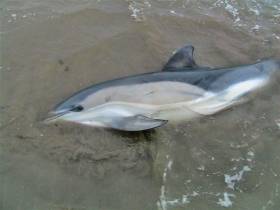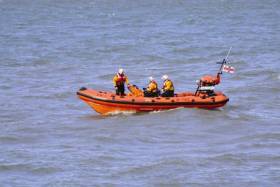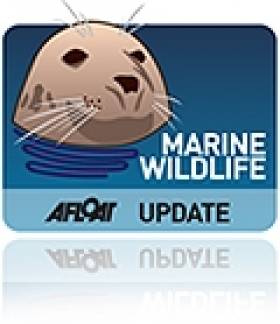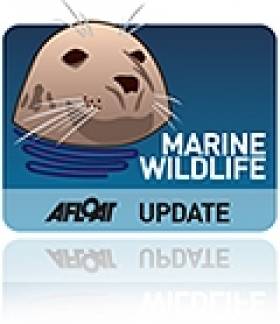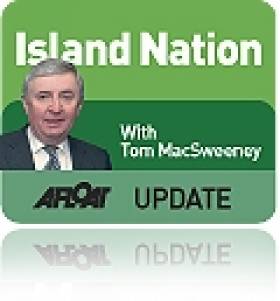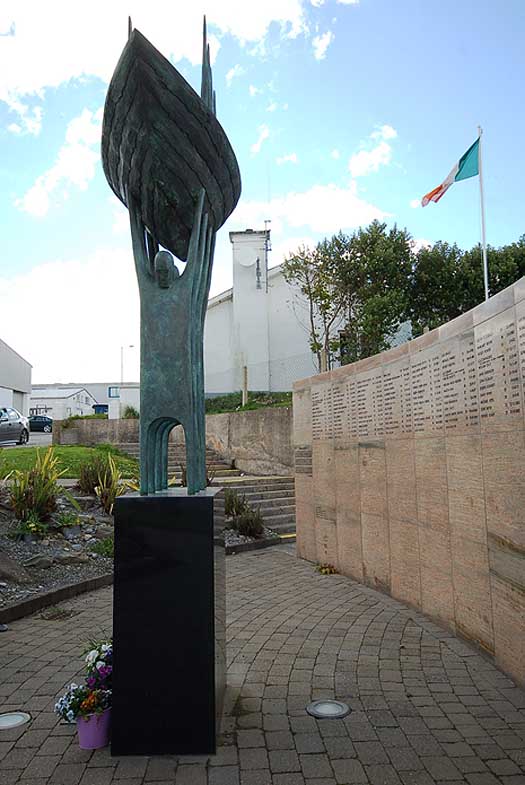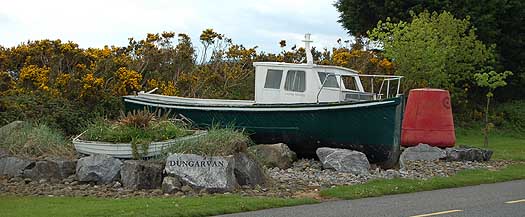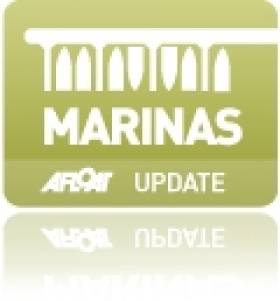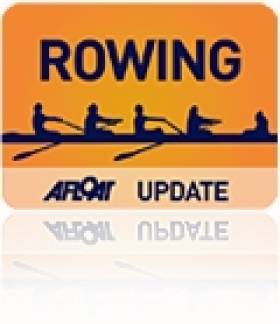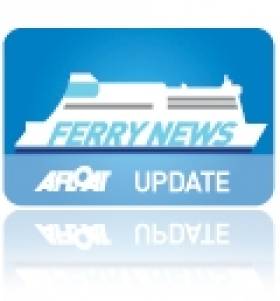Displaying items by tag: Waterford
Common Dolphins Strand In Dungarvan
#MarineWildlife - The Irish Whale and Dolphin Group reports on the stranding of three common dolphins in Dungarvan at the weekend.
Two of the three dolphins were still alive when found on Friday (13 January), though they were in “poor condition”, and one was later confirmed dead. The other was last seen in the area on Saturday and its current status is unconfirmed.
The news comes just days after two common dolphins were refloated after stranding in Tarbert, Co Kerry, as previously reported on Afloat.ie.
It also follows a spate of marine wildlife deaths on the Waterford coast during the week, incidents that have been blamed on pair trawling activity.
Helvick Head Lifeboat Crew Rescue Man From Water After Pier Car Crash
#RNLI - Helvick Head RNLI rescued a man who got into difficulty in the water at Helvick Pier early this morning (Sunday 11 September).
The volunteer lifeboat crew was requested to launch their inshore lifeboat at 7.12am following a report of a potential tragedy at Helvick Pier on the Co Waterford headland.
On arriving at the car park, the crew observed a crashed car. The lifeboat took to the water immediately and within seconds shore helpers spotted a casualty in the water.
Once on scene with the casualty, crew members Shane Breathnach and Dónal Ó Faoláin entered the water to assist.
The casualty, who was struggling to stay afloat, was helped into the lifeboat where he was treated for hyperthermia by helm Shay Young and crew member Cathal Reilly.
The man was then returned to Helvick Lifeboat Station where he was cared for until the ambulance arrived and he was transferred to hospital.
"It was a close call this morning and we would like to commend local fishermen Barty Whelan and Richard Tobin who were active on the shore in raising the alarm, spotting the casualty and remaining on site," said Young following the callout.
"Once on scene, it took all four of us aboard the lifeboat to bring the man in and do what was necessary. We would like to wish the casualty a full recovery following his ordeal."
Impressive Set of Wins By Irish at World Masters Regatta
#rowingworldmasters – Ireland had an impressive set of wins at the World Masters Regatta, the four-day event which finished today in Hazewinkel in Belgium. There was a notable win in the men’s eight in the E category (average age 55 or more) where the Irish crew beat one of Russia’s best clubs, Dynamo Moscow, by less than a canvas - .31 of a second. The strokeman of the Russian crew, Vitali Eliseev, stroked the World Championship-winning four in 1981. The Irish crew was a composite of Old Collegians, Belfast Boat Club, Neptune, Waterford and Commercial. Denis Crowley – who was in the eight – won single sculls races in three different age categories.
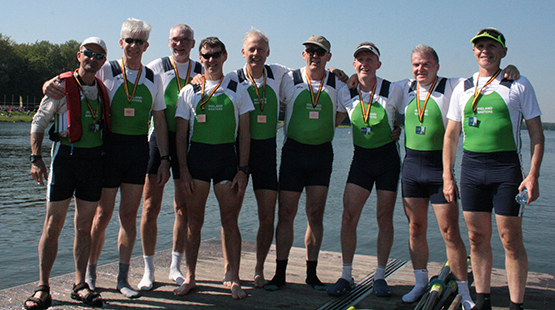
The Irish composite which beat Dynamo Moscow at the World Masters Regatta
World Masters Rowing Regatta, Hazewinkel, Belgium (Ireland Wins):
Men – Eight, E (Average 55 yrs or more): Old Collegians, Belfast BC, Neptune, Waterford, Commercial (John Hudson, Denis Crowley, Gerard Murphy, Michael Heavey, Colin Dickson, Colin Hunter, Francis O’Toole, Donal McGuinness, Al Penkert) 3 min 11.13 (1,000m)
Four, coxed, E (Average 55 yrs or more): Commercial, Belfast, Old Collegians, Waterford. Pair, E: Belfast BC. Pair, D (Avg 50+): Commercial. Pair, F (Avg 60+): Cappoquin.
Sculling – Double, F (Avg 60+): Carlow, Athlone. Single: B (36+), C (43+) and D (50+): Commercial (D Crowley). C (43+): Galway RC (S Heaney).
Women – Sculling, Single, A (27+): Three Castles (B Quinn).
#Biodiversity - Coastwatch volunteers taking part in events for National Biodiversity Week have discovered a massive honeycomb reef as much as a kilometre long in the Waterford Estuary.
Members of the public began checking the shore between Hook Head in Co Wexford and Annestown in Co Waterford on Monday 18 May, an area that has previously shown signs of honeycomb reefs.
But volunteers were astounded to make this latest massive discovery, and Coastwatch members are working to ascertain if it might be the biggest reef of its kind in the world, a record currently held by Saint-Malo in Brittany.
Karen Dubsky of Coastwatch Europe said "first results look very encouraging. We are looking for more surveyors to give an hour and search their shore."
Events continue till Monday 1 June for Ireland's National Biodiversity Week 2015, with today (Friday 22 May) being International Day for Biological Diversity.
Upcoming flagship events include a marine wildlife-watching trip to Lambay Island next Wednesday 27 May, but the event calendar lists a whole host of activities both around the coast and inland throughout the country.
Killer Whale Strands On Waterford Beach
#MarineWildlife - The Irish Whale and Dolphin Group (IWDG) reports on a killer whale stranding near Tramore in Co Waterford yesterday (Friday 30 January).
The five-metre-long female orca was described as being in "a very fresh condition" and was found to have very worn teeth, which points to malnutrition as a potential cause of death.
A post-mortem is scheduled to be carried out tomorrow by a team from the IWDG and Galway-Mayo IT.
The incident is the latest in a "disturbing high" rate of cetacean strandings around the Irish coast this January, with a total of 32 recorded across nine identifiable species.
While it's as yet unknown what has caused this spike in numbers, the recent severe weather systems coming from the Atlantic may be a factor in driving carcasses of animals that may have died of natural causes towards the Irish coast.
The IWDG has more on the story HERE.
#islandnation – The 'reach' of friendship which sailing has was demonstrated to me when I was trying to record kittiwakes who live on the cliff face in Dunmore East. The County Waterford fishing port has a colony of the black-legged birds which is unique.
I had actually gone there to see the new leisure marine facilities opened by the Minister for the Marine, Simon Coveney, who said his Department has spent €450,000 on them and to get reaction to his announcement that the long-awaited dredging of the port, which has been on hold for many years, would be going ahead. It will cost about €4m and is badly-needed by the local fishing fleet. Quite a bit of the harbour has silted up over the years.
(See also WM Nixon's blogs: Dunmore East: A Suitable Harbour for a Marina? and Could Dunmore East's Development Be Key to Ireland's Cruising Success? – Ed)
I was driving past the kittiwakes, stopped to have a look and heard their distinctive cry. I have recorded a lot of different sound effects during my time as a radio reporter, but it took a lot of effort to record those black-legged kittiwakes high up over the roadway. They are a small oceanic bird which breeds in the Northern Hemisphere from Portugal to the low Arctic zones. Their distinctive call sounds like "kitt-ee-wayke". What is unique about them in the inner harbour in Dunmore East is that their colony is unique in Ireland for its proximity to humans.
It took the best part of an hour to get 30/40 usable seconds of sounds and I had just finished when the crew from Waterford Harbour's Sigma 33 OOD, Flyover, owned by David Marchant, asked me what I was doing. They had just brought it back from Kinsale, where they had been racing in that South Cork club's Spring series. I spent a pleasant half-an-hour discussing the sailing ability of Sigmas. They sailed Flyover very well and took a few prizes out of Kinsale.
They also took her to Cork for the RCYC's Autumn series last year, where they also did well.
If you want to hear how the kittiwakes sounded on my radio programme, click THIS ISLAND NATION link.
I understand now why and how it takes so much time and effort to make Nature programmes!
PEOPLE OF THE SEA – OR ARE WE ?
The new slipway for leisure craft in Dunmore alongside the harbour's sailing club is welcome. I also stopped for a while at the memorial to lost seafarers in the village. It is an impressive monument and I found it an emotional and salutary experience to read the names on the memorial and realise how many have died in maritime tragedies around this part of the coastline.
The lost seafarers monument in Dunmore East
That led me to play on my radio programme, 'SEA PEOPLE,' a song performed by a choir composed of the people of another fishing community - the fishermen and women of Newfoundland & Labrador. Calling themselves 'Folk of the Sea,' they formed their group to highlight the importance of fishing tradition after their community suffered from the collapse of the cod fishery. They are sea people and so are we, the Irish. Forty per cent of the population of Ireland lives in coastal and rural communities. Ireland's cities are all located close to the coast. Half of Ireland's population lives within 10 kilometres of the coastline.
But political commitment to the marine sphere is still lacking. While Taoiseach Enda Kenny extolled what his Government intends to achieve when speaking at the naming ceremony of the new Naval vessel, the L.E.Samuel Beckett in Dublin last Saturday, he has not acted in regard to the effective work of the Oireachtas Committee Report on Coastal and Island Communities. It delivered it report to the Dáil last January after a year's work, containing realistic proposals about the future of these communities. The Committee called for a Dáil debate on their report and recommendations.
Five months later there has been no positive response from the Government. When I asked the Taoiseach's Department why he had not responded to the Committee's request, his PR people told me to ask the Chairman of the Committee. He is a Fine Gael TD and has not been given an explanation!
REMOVING FISH DISCARDS COULD DAMAGE SEABIRDS AND MARINE LIFE
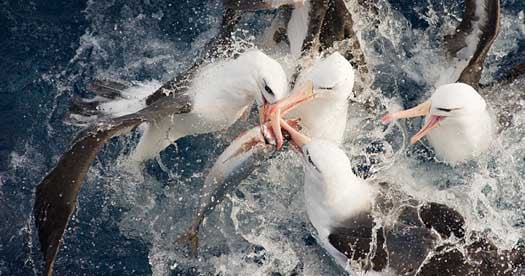
Discards are food to seabirds
Referring back to sea birds, the EU decision to end the practice of discards, by which fishermen dumped catches overboard because they could not land it ashore because of fear of prosecution for quota infringements, could be harmful to bird life and fish species rather than a benefit. That view has been expressed by a Scottish Professor, Mike Heath of the University of Strathclyde.
He says that wildlife everywhere capitalise on waste from human activity and feed on discarded fish. That includes seabirds, marine mammals, seabed animals and other fish. "Banning discards of fish could have unintended effects on the ecosystem," he warns.
NAVAL SHIP NAMES NOT POPULAR
The Government's decision to name the two new Naval ships after Samuel Beckett and James Joyce, ending the tradition of vessels called after female Celtic mythological figures, is not universally popular either within or outside the Naval Service. Serving personnel are not permitted to speak publicly, but several have privately expressed disagreement. Former Naval officers have voiced disgust. Former Minister for Defence and Justice, Alan Shatter, has been described as forcing the change through. Taoiseach Enda Kenny named the first of the new ships the Samuel Beckett on Saturday in Dublin, noticeably not at the Naval Base in Haulbowline in Cork Harbour. He avoided referring to the naming controversy. Ending tradition is never without challenge, but this decision has not been well received.
BIGGEST ICE CLEARANCE IN 35 YEARS
The Great Lakes between the USA and Canada are huge inland. The US Coast Guard this week said the past Winter season had produced "the thickest and most expansive ice cover in 35 years." It released statistics at the end of Operation Taconite, the biggest ice clearance operation to keep shipping moving on the Great Lakes "through one of the most brutal winters on record."
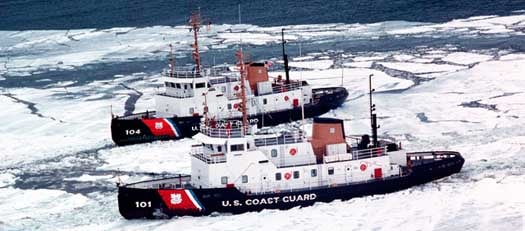
US Icebreakers clearing ice for ships on the Great Lakes
Besides various liquid and dry cargoes, vast amounts of iron ore from the northern shores of Lake Superior were carried to steel mills in Lake Erie and Lake Michigan in convoys supported by Coast Guard icebreakers which operated for 160 days. They cleared ice for 946 vessel movements carrying 33 million tons of cargo that had a commercial value of $1.2 billion. This kept industrial production and power generation going in the Great Lakes Region during the winter months.
NORWEGIAN OIL ROW
An environmental and political row has broken out in Norway over the country's biggest offshore oil find since 1974, an estimated resource of 2.9 billion barrels. Opposition parties in an alliance holding the Parliamentary majority wants the Government to make the oil companies use electricity from land to power their offshore oil platforms to reduce greenhouse gases. State oil company, Statoil and its partners in the new Sverdrup find say this will delay "the biggest offshore development in decades." Platforms use gas turbines which account for 25 per cent of Norwegian emissions.
REAWAKENING INTEREST IN GLANDORE
Three South Coast clubs are making a determined effort to revive interest in Glandore Regatta which will be held on the June Bank Holiday Weekend. As Afloat.ie previously reported, Kinsale and the Royal Cork at Crosshaven are joining with Glandore Harbour in a combined effort to get more boats to sail to the West Cork harbour for the event.
"It has been many years since this regatta has had the south coast fleets invade their shores," say the clubs. Kinsale YC yachts will race from their port on Friday, May 29, rounding the Fastnet Rock to finish in Glandore. This replaces the annual Castletownshend. There will be another race from Kinsale direct to Glandore on the Saturday. That day RCYC boats will start from Weaver's Point at Crosshaven at 0855 to race to Glandore. On the Sunday there will be a 1055 first gun for a race from Glandore to Kinsale.
DUNGARVAN PONTOON DEVELOPMENT
Dungarvan Harbour Sailing Club in County Waterford has a new pontoon which can berth 30 boats. It replaces an older structure which had been in place since the early 1990s. This club has a history going back to 1946. The 16-foot 'Petrel' dinghy is the boat which got dinghy sailing established in this south-east club, the first of these being built from designs in an American sailing magazine in 1958. While this was a local boat, club members acquired GP14s for inter-club racing and the club fleet now includes Wayfarers, Lasers, Mirrors and Toppers. Its cruiser fleet has expanded.
A maritime welcome to Dungarvan in County Waterford where a new pontoon has been installed for visiting boats
Depth limitations in the harbour have made bilge-keelers popular. Though dredging was not possible for the new pontoon, future plans are for a more extensive marina. The new facility will provide short-term berthing for Club members as well as access for visiting boats.
• THIS ISLAND NATION, the hour-long maritime programme can be heard on the Afloat website by clicking this link
• Twitter: @TomMacSweeney and @Afloatmagazine
Dungarvan Harbour Sailing Club 30–Berth Pontoon Will Attract Visiting Boats to Waterford
#tourism – A new Dungarvan pontoon facility to provide short term temporary berthing on the Copper coast in West County Waterford has been opened. The facility opened by Dungarvan Harbour Sailing Club will provide berthing for approximately 30 berths on the West Waterford coast. The new facility replaces an older interim structure which had been in place since the early 1990s.
The facility is for Club members on a daily fee basis as well as access for visiting boats. It is expected the latter aspect will support the development of marien tourism on the West Waterford coast.
The facility was opened on 11th of May the Minister for Agriculture, Food and the Marine. Simon Coveney T.D.
Speaking at the opening, the Commodore of Dungarvan Harbour Sailing Club, Joan Moloney, said "This is a proud day for sailing in Dungarvan as it represents another important development in the 68 year history of the club. The modernisation of the pontoon facilities will provide safer boat access for families and sailors and will support tourism development in the town". She then went on to thank those in the club who have worked tirelessly to bring the project to fruition.
Moloney thanked Dungarvan Town Council and in particular the unstinting efforts of Joe O'Flaherty the recently retired Town Clerk and Eoin McGarry of McGarry Construction was also praised for his effective and efficient installation of the facilities together with the suppliers Inland and Coastal. During the project a late technical hitch prevented dredging work being undertaken in addition to the pontoon installation.
Ghent Rowing Suits Galway College
#ROWING: Colaiste Iognaid carried their good form into a second day at the Ghent International Regatta in Belgium today. The Galway school club won the junior men’s coxed four and their coxless four finished second in their final. Carrie Nolan of New Ross won a two-boat under-23 single sculls final, while Waterford’s Raymond O’Mahony and Andrew Goff were third in the men’s under-23 double sculls.Waterford finished third in the junior women's quadruple sculls.
Ghent International Regatta (Irish interest; selected results)
Saturday
Men
Four – Junior: 2 Colaiste Iognaid (A Coyne, D McCarthy, L Rigney,
D Coen)
Pair – Senior: 3 Lady Elizabeth (B Smyth, S King).
Women
Sculling, Single, Junior 18: 2 Commercial (A Rodger)
Sunday
Men
Four, coxed: 1 Coláiste Iognáid (K McGlacken, E Walls-Tuite, L Rigney, D Coen; cox: D Young). Four: 2 Col Iognaid (Rigney, McCarthy, Coyne, Coen).
Pair – Senior: 3 Lady Elizabeth (Smyth, King).
Sculling, Double – Senior B: 3 Waterford (R O’Mahony, A Goff).
Women
Sculling, Quadruple – Junior 18: 3 Fermoy (A Walsh, S Murphy, K Bartley, S Cotter).
Single – Senior B: 1 New Ross (C Nolan).
Guests Stranded On Private Island As Ferry Operator Suspends Service
#FerryNews - Guests and staff were stranded for two hours last night (27 September) in a dispute between a Waterford private island resort and its ferry operator, as RTÉ News reports.
The operator of the ferry to Waterford Castle Island Resort suddenly suspended services at 8pm last night while guests were being served dinner.
Gardaí were called in to help resolve the dispute, and services resumed after two hours, though it is not yet known what agreement was reached.
According to The Irish Times, the resort east of Waterford city on the River Suir – which includes a 19-room hotel, golf course and numerous residential lodges - was appointed a liquidator last month after suffering a financial crash but is still continuing to trade.
Boy Drowns In 'Freak Accident' On Waterford Beach
#Drowning - TheJournal.ie is reporting that a two-year-old boy has drowned in a "freak accident" at a Waterford beach yesterday (22 August).
The boy was at Boatstrand near Bunmahon, between Tramore and Dungarvan, with family around 7pm yesterday evening when he went to play away from the group and got into difficulty close to the shore.
Gardaí are investigating the incident and have not as yet released further details.
The tragedy brings to mind last month's shocking series of drownings around Ireland during the recent heatwave.



























